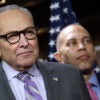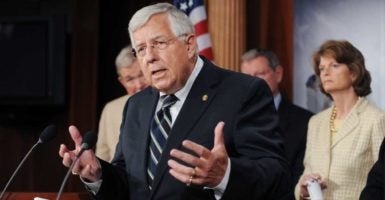Wyoming produces 40 percent of the nation’s coal. That’s more than the next five largest coal-producing states combined. Yet, in a speech on the Senate floor Tuesday, Sen. Mike Enzi, R-Wyo., laid out why he opposes bailing out the United Mine Workers of America pension fund, and why taxpayers should too.
The issue at stake is the UMWA’s unfunded pension plan, which is on track to become insolvent in less than a decade. Some legislators want to give the UMWA access to money in the Abandoned Mine Land Reclamation Fund, combined with taxpayer dollars, so that it can continue paying 100 percent of its promised benefits.
Some policymakers are pushing for action before recess, and if not then, at least by the end of the year.
It’s deplorable, and could be devastating to UMWA workers, that the union promised retirement security to its workers and then failed to set aside the money necessary to keep those promises. But as Enzi pointed out, “the UMWA agreement was made between the members and the UMWA, not between the members and the American taxpayer.” The union—not taxpayers—should have to account for the union’s broken promises.
Moreover, the UMWA is just one of more than 1,300 multiemployer, or union, pension plans—over 90 percent of which are also underfunded:
If we take the steps my colleagues are advocating for with regard to the UMWA, what are we going to do when the next underfunded pension plan comes looking for assistance, and what about the plan after that?
I’m not sure how Congress would help the UMWA and not the others. Paraphrasing President Washington: We are walking on untrodden ground. There is scarcely any part of our conduct which may not hereafter be drawn into precedent.
While the federal government should not be shoring up private sector pensions, it does have a role in providing required pension insurance through the Pension Benefit Guaranty Corporation. If Congress does not bail out the UMWA pension fund and it becomes insolvent and unable to pay benefits, the Pension Benefit Guaranty Corporation will provide it with adequate funding to pay minimum guaranteed benefits.
This is what has happened in the past when private pension plans have failed, and this is what will happen to many more that fail. The problem is, however, that the Pension Benefit Guaranty Corporation’s multiemployer program is itself massively underfunded. With less than $2 billion in assets on hand and $611 billion in unfunded liabilities, Enzi said he “would equate that to trying to catching a whale shark with a net made for minnows.”
While advocates of the UMWA legislation claim that it would be paid for by fees from coal companies, it would be a bailout—pure and simple.
The legislation would allow the UMWA to access up to $490 million per year from the Abandoned Mine Land Reclamation Fund. That money would first come from interest earned on the fund’s balance, and the rest would come from taxpayers.
As Enzi pointed out, in 2012, interest from the Land Reclamation Fund covered less than a fifth of the UMWA’s health care shortfalls, leaving taxpayers on the hook for hundreds of millions of dollars in UMW retiree health benefits. Including UMWA pension costs would add even more to taxpayers’ costs.
Furthermore, the mere fact that a coal cleanup fund exists does not mean one select coal union should have access to that fund for its unfunded pensions. Enzi likened this to allowing the Central States Pension Fund access to the Highway Trust Fund on the basis that the union represents truckers who pay into the Highways Trust Fund.
While Enzi said the projected 25 percent decline in coal production over the last two years “breaks his heart,” he argued that the UMWA proposal would do “absolutely nothing for miners who are not members of the UMWA,” nor for the “nearly 11,000 workers in the coal industry [who] have lost their jobs in the last year, largely due to this administration’s policies.”
Instead, Enzi argued that passing this bill would send a bad message: “ … if you’re a member of the United Mine Workers of America, we want to help with your health care and pensions. But if you’re not, or if you want your job back, then too bad.”
While expressing the deepest respect for coal miners, and concern for those who have been laid off in Wyoming and across the country, Enzi concluded his statement by emphasizing his priority to maintain the financial solvency of America in a way that is fair to federal taxpayers across America.





























